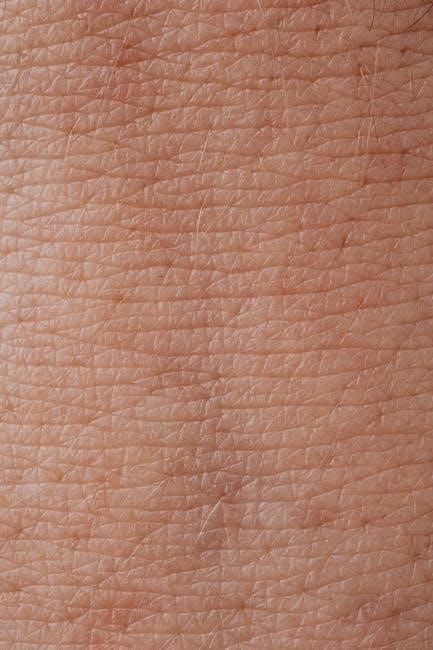The Body Is Not an Apology by Sonya Renee Taylor is a transformative guide to radical self-love, challenging societal beauty standards and body shame. Available as a free PDF, it offers tools for empowerment and liberation, fostering a global movement toward self-acceptance and collective healing.
What is “The Body Is Not an Apology”?
The Body Is Not an Apology is a groundbreaking book by Sonya Renee Taylor that challenges societal norms and promotes radical self-love. It began as a conversation between friends and evolved into a global movement advocating for body positivity and social justice. The book, available as a free PDF, explores the intersection of bodies, identity, and oppression, offering tools to unlearn body shame and embrace uniqueness. It empowers individuals, particularly marginalized communities, to reject societal beauty standards and reclaim their bodies as worthy of love and respect. The movement has grown into a digital media and education platform, reaching nearly 1 million people monthly, fostering a culture of radical self-love and collective liberation worldwide.
Why Radical Self-Love Matters
Radical self-love is a powerful act of resistance against systems that perpetuate body shame and oppression. It challenges societal beauty standards and empowers individuals to embrace their uniqueness. By fostering self-acceptance, radical self-love heals the wounds inflicted by body terrorism and systemic injustice. It is not just a personal journey but a collective movement toward liberation, enabling individuals to reclaim their worth and dignity. Radical self-love dismantles the notion that bodies must conform to narrow ideals, promoting inclusivity and equity. It is a foundational tool for social justice, encouraging individuals to love themselves unapologetically and advocate for a world where all bodies are valued and respected. This mindset is transformative, fostering resilience and empowerment on a global scale.

Author Background
Sonya Renee Taylor is a celebrated activist, poet, and founder of The Body Is Not an Apology movement. Identifying as fat, Black, and queer, she champions radical self-love and body liberation, inspiring global transformation through her work and writings.
Sonya Renee Taylor: Biography and Activism
Sonya Renee Taylor is a renowned activist, poet, and founder of The Body Is Not an Apology. Identifying as fat, Black, and queer, she has dedicated her life to challenging systemic oppression and promoting radical self-love. Born with a passion for social justice, Taylor’s activism began in her early years, focusing on body liberation and intersectional equity. Her work emphasizes the interconnectedness of body positivity, identity, and social justice, particularly for marginalized communities. Taylor’s vision for a world where all bodies are honored has grown into a global movement, inspiring millions to embrace their uniqueness and dismantle oppressive systems. Her commitment to education and empowerment has made her a pivotal figure in the fight for collective liberation.
Taylor’s Vision for Radical Self-Love
Sonya Renee Taylor envisions a world where radical self-love is the cornerstone of social justice and global transformation. She argues that embracing one’s body, without apology, is a revolutionary act against oppressive systems. Taylor’s philosophy extends beyond individual empowerment, aiming to dismantle systemic inequalities by challenging societal beauty standards and body terrorism. Her vision includes fostering a culture where all bodies are celebrated, regardless of race, gender, size, or ability. Through education, digital media, and community engagement, Taylor seeks to create a movement that not only heals personal wounds but also collectively liberates society from the shackles of body shame and discrimination. This vision underscores the transformative power of self-love as a tool for societal change.

Key Concepts in the Book
The Body Is Not an Apology explores body positivity, self-care, and the intersection of identity and social justice. It emphasizes unlearning shame, celebrating uniqueness, and dismantling oppressive systems. This book challenges societal beauty standards, advocating for radical self-love as a transformative force for individual and collective liberation. By addressing systemic inequalities, Taylor offers a comprehensive framework for healing and empowerment, encouraging readers to embrace their bodies and fight for a world where all bodies are honored. The text underscores the importance of self-care as a vital aspect of well-being and a powerful tool for social change. Through personal stories and practical advice, Taylor provides readers with the tools they need to cultivate radical self-love and work toward a more inclusive and equitable society. The book also highlights the role of education and digital media in spreading its message, making it accessible to a wide audience. Overall, The Body Is Not an Apology is a call to action, urging readers to challenge harmful narratives and embrace their bodies without apology. By doing so, it aims to create a global movement that fosters self-acceptance, healing, and collective liberation from oppressive systems. The book’s key concepts are central to its mission of empowering individuals and transforming society, making it a essential read for anyone seeking to understand the power of radical self-love. Through its exploration of body positivity, self-care, and social justice, The Body Is Not an Apology provides a comprehensive guide to living a life free from body shame and societal expectations. Its message of empowerment and liberation continues to resonate with readers worldwide, making it a vital resource for anyone on the journey of self-discovery and radical self-love.
Body Positivity and Self-Care
The Body Is Not an Apology emphasizes body positivity as a powerful tool for challenging societal beauty standards and fostering self-acceptance. It advocates for self-care as essential for both physical and mental well-being, rejecting the notion that health is a luxury. Taylor encourages individuals to listen to their bodies, celebrate their uniqueness, and invest in their health as a vital aspect of radical self-love. The book highlights the importance of embracing body diversity and rejecting shame, promoting a world where all bodies are valued. By prioritizing self-care, readers are empowered to dismantle oppressive systems and embrace their true selves. This approach not only heals personal wounds but also contributes to a broader cultural shift toward acceptance and liberation.
The Intersection of Bodies, Identity, and Social Justice
The Body Is Not an Apology delves into the intricate connection between bodies, identity, and social justice, revealing how systemic oppression intersects with body image. Taylor explores how race, gender, sexuality, and body size influence experiences of marginalization, advocating for radical self-love as a form of resistance. The book examines historical and contemporary inequalities, offering a framework for understanding and dismantling these systems. By addressing the societal structures that perpetuate body shame, Taylor empowers individuals to embrace their identities and challenge injustice. This intersectional approach fosters a deeper understanding of how body liberation is integral to broader social justice movements, creating a path toward collective healing and equity.
Unlearning Body Shame
The Body Is Not an Apology emphasizes the importance of unlearning body shame, a process rooted in recognizing and rejecting societal norms that demean diverse bodies. Taylor guides readers to confront internalized negativity and embrace their bodies as worthy and deserving of love. The book offers practical tools to dismantle harmful beliefs and replace them with self-affirming practices. By addressing the emotional and psychological toll of body shame, Taylor empowers individuals to reclaim their bodies as sources of strength and joy. This liberation is not just personal but collective, fostering a culture where all bodies are valued and respected. Radical self-love becomes a powerful act of resistance and healing.
Celebrating Uniqueness and Dismantling Oppression
The Body Is Not an Apology calls for a radical shift in how society views diversity, advocating for the celebration of every body’s uniqueness. Taylor argues that body oppression is deeply intertwined with systemic injustices, such as racism, sexism, and classism. By dismantling these structures, individuals can reclaim their identities and challenge the norms that marginalize them. The book encourages readers to honor their distinctiveness and reject the idea that certain bodies are more valuable than others. This celebration of diversity is not just a personal act but a collective movement toward a more inclusive and equitable world. Taylor’s vision is one where all bodies are seen as worthy and deserving of respect and love, fostering a society free from oppression.

The Body Is Not an Apology Movement
The Body Is Not an Apology movement began as a conversation, evolving into a global phenomenon advocating radical self-love and body empowerment, inspiring millions to embrace their true selves.
From a Conversation to a Global Movement
The Body Is Not an Apology began as a heartfelt dialogue between Sonya Renee Taylor and her friend Natasha, discussing unintended pregnancy and societal body expectations. This intimate conversation sparked a global revolution, transforming into a digital media and education company. Today, it reaches nearly one million people monthly, exploring intersections of bodies, identity, and social justice. The movement emphasizes radical self-love as a tool for healing and liberation, challenging oppressive systems and fostering a culture of acceptance. Through its PDF resources and workshops, it empowers individuals to embrace their uniqueness and dismantle body shame, creating a ripple effect of self-love worldwide.
Empowering individuals to Embrace Their Bodies
The Body Is Not an Apology empowers individuals to embrace their bodies by challenging societal norms and fostering radical self-love. Through its PDF resources and workshops, it provides tools to unlearn body shame and celebrate uniqueness. The movement emphasizes self-care as essential for mental and physical well-being, encouraging individuals to listen to their bodies and invest in their health. Sonya Renee Taylor’s vision extends beyond personal empowerment, aiming to dismantle oppressive systems and promote collective liberation. By embracing radical self-love, individuals are inspired to honor their bodies and advocate for a world where all bodies are respected and celebrated, regardless of size, race, or identity.
The Role of Education and Digital Media
The Body Is Not an Apology leverages education and digital media to spread its message of radical self-love globally. Through online platforms, it reaches nearly one million people monthly, offering accessible resources and workshops. The PDF version of the book and its companion workbook provide tangible tools for individuals to embrace body positivity and self-care. Digital media has been instrumental in amplifying Taylor’s activism, creating a community that transcends borders. By utilizing modern technology, the movement ensures that its empowering content is available to a diverse audience, fostering a cultural shift toward acceptance and liberation from body shame and societal oppression.

Impact of the Book
The Body Is Not an Apology has profoundly influenced social justice movements, inspiring transformative stories of self-love and empowerment. It has sparked cultural shifts, fostering a global embrace of radical self-acceptance and healing from body shame, becoming a cornerstone for collective liberation and societal change.
How the Book Has Influenced Social Justice Movements
The Body Is Not an Apology has become a foundational text for social justice movements, inspiring global conversations about body positivity, identity, and systemic oppression. By-centering radical self-love, the book has empowered marginalized communities to challenge oppressive beauty standards and reclaim their bodies. It has influenced movements like fat liberation, racial justice, and LGBTQ+ rights, emphasizing intersectionality and inclusivity. Taylor’s work has sparked a cultural shift, encouraging individuals to embrace their uniqueness and demand societal change. The book’s message of collective liberation has resonated worldwide, making it a vital resource for activists and educators. Its impact continues to grow, fostering a more equitable and compassionate society.
Reader Testimonials and Transformative Stories
Readers of The Body Is Not an Apology share powerful testimonials about its life-changing impact. Many describe the book as a source of healing, helping them shed decades of body shame and embrace radical self-love. One reader shared how the book empowered them to reject societal beauty standards and love their body unconditionally. Another highlighted how it helped them reconnect with their identity and find liberation from oppressive systems. The stories reveal profound transformations, with readers expressing gratitude for Taylor’s unflinching honesty and revolutionary perspective. These testimonials underscore the book’s role in fostering personal and collective liberation, making it a cherished resource for those seeking self-acceptance and empowerment.
Cultural Shifts Toward Radical Self-Love
The Body Is Not an Apology has sparked a cultural shift, inspiring a movement toward radical self-love and body acceptance. By challenging traditional beauty standards and promoting inclusivity, the book has helped redefine how society views diverse bodies. It has encouraged conversations about body positivity, identity, and social justice, creating a ripple effect across social media, education, and activism. The PDF version has made these ideas accessible globally, fostering a community that celebrates uniqueness and rejects shame. This cultural transformation emphasizes self-care as essential for well-being, empowering individuals to embrace their bodies and demand a world where all bodies are honored and respected.

Tools and Resources
The Body Is Not an Apology offers a workbook and practical steps for radical self-love, providing readers with actionable tools to embrace their bodies and dismantle shame.
Your Body Is Not an Apology Workbook
Your Body Is Not an Apology Workbook is a transformative guide by Sonya Renee Taylor, offering practical tools to embrace radical self-love. Designed as a companion to the book, it provides exercises, reflections, and actionable steps to help individuals unlearn body shame and reclaim their worth. The workbook encourages self-care, celebrating uniqueness, and dismantling oppressive systems. It empowers readers to invest in their health and well-being, fostering a deeper connection with their bodies. Available as a downloadable resource, the workbook has become a vital instrument for personal and collective liberation, aligning with the movement’s mission to honor all bodies and promote global transformation through radical self-love.
Practical Steps for Living Radical Self-Love
Living radical self-love begins with intentional, daily practices that challenge societal norms and foster self-acceptance. Sonya Renee Taylor’s workbook offers actionable steps, such as listening to your body, embracing its uniqueness, and rejecting shame. It encourages individuals to redefine beauty standards and prioritize health as a form of self-care. By dismantling internalized oppression and cultivating compassion, readers can transform their relationships with their bodies. The workbook also emphasizes the importance of community, urging collective action to create a world where all bodies are valued. These practical steps empower individuals to move beyond societal expectations and embrace their authentic selves, paving the way for personal and collective liberation.
The Body Is Not an Apology leaves a lasting legacy by empowering individuals to embrace radical self-love, fostering a world where all bodies are celebrated and valued equally.
The Lasting Legacy of “The Body Is Not an Apology”
The Body Is Not an Apology has left an indelible mark on the global conversation about radical self-love and body liberation. By challenging oppressive systems and fostering a culture of acceptance, Sonya Renee Taylor’s work has inspired millions to embrace their uniqueness. The book’s emphasis on body positivity, self-care, and social justice has created a ripple effect, encouraging individuals to dismantle internalized shame and advocate for collective liberation. Its digital reach and educational resources have made it a cornerstone for empowerment, ensuring that future generations will continue to benefit from its transformative message. This legacy underscores the power of radical self-love as a catalyst for societal change and healing.

A Call to Action for Collective Liberation
The Body Is Not an Apology extends beyond personal empowerment, urging readers to join a broader movement for collective liberation. Sonya Renee Taylor emphasizes that radical self-love is not just an individual journey but a collective effort to dismantle systems of oppression. By embracing body positivity and challenging societal norms, individuals can contribute to a world where all bodies are valued and respected. The call to action encourages readers to share their stories, support one another, and advocate for policies that promote inclusivity and equity. Together, this movement aims to create a society where radical self-love is the foundation for global transformation and social justice.

Additional Resources
Access The Body Is Not an Apology PDF and workbook for practical tools on radical self-love. Engage with the global community for support and shared growth.
Where to Find the PDF and Workbook
The Body Is Not an Apology PDF and its accompanying workbook are widely available online. Platforms like Gooread.me offer free downloads, while major retailers provide e-book and paperback versions. The workbook complements the book, offering exercises to unlearn body shame and embrace radical self-love. Digital versions ensure accessibility, making these resources easy to obtain for global readers. Taylor’s official website and online marketplaces are reliable sources, ensuring authenticity and convenience for those seeking transformative tools for self-love and liberation.
Engaging with The Body Is Not an Apology Community
The The Body Is Not an Apology community is a vibrant space for radical self-love and collective liberation. Through digital platforms, educational resources, and global events, members foster connection and empowerment. The movement, which began as a conversation, now spans worldwide, offering workshops, webinars, and online forums. Individuals can engage by sharing their stories, participating in activism, and embracing body positivity. The community encourages creativity, with members sharing art, writing, and personal journeys. By joining, individuals become part of a supportive network dedicated to dismantling oppression and celebrating diverse bodies. This inclusive space provides tools and inspiration for living authentically and fostering societal change.

Historical Context
The Body Is Not an Apology emerged from a conversation about body autonomy and societal shame, evolving into a global movement combating body terrorism and oppressive systems.
Body Terrorism and Its Effects
Body terrorism refers to systemic oppression that polices bodies based on race, gender, size, and ability, perpetuating shame and violence. Sonya Renee Taylor’s work highlights how these oppressive systems inflict trauma, limiting self-worth and autonomy. The effects are profound, leading to internalized hatred and disconnection from one’s body. The Body Is Not an Apology PDF addresses these injustices, offering radical self-love as a healing balm. Taylor’s approach emphasizes dismantling societal beauty standards and reclaiming body autonomy. By challenging these violent systems, the book empowers individuals to embrace their uniqueness and resist oppression, fostering liberation and collective healing on a global scale.
Historical Movements That Paved the Way
The journey toward radical self-love and body acceptance has been shaped by historical movements that challenged societal norms. The Civil Rights Movement, feminist activism, and LGBTQ+ advocacy laid the groundwork for conversations about body autonomy and identity. Kimberlé Crenshaw’s intersectionality theory highlighted how race, gender, and class intersect, influencing body perception. The Body Positivity movement of the 1960s and 1970s further amplified these discussions, celebrating diverse bodies and rejecting oppressive beauty standards. These movements created a foundation for The Body Is Not an Apology to thrive, emphasizing the need for collective liberation and dismantling systemic oppression. Taylor’s work builds on this legacy, addressing modern issues like fatphobia, ableism, and body terrorism.

Global Reach and Influence
The Body Is Not an Apology has grown into a global movement, with Sonya Renee Taylor’s work reaching millions worldwide, empowering individuals to embrace radical self-love and challenge oppressive systems through education and digital media.
Taylor’s Travels and International Impact
Sonya Renee Taylor’s work has transcended borders, inspiring a global audience to embrace radical self-love. Her travels have taken her worldwide, combating body terrorism and amplifying marginalized voices. Through her activism, she has shared stories of liberation, highlighting how systemic oppression affects bodies globally. The Body Is Not an Apology movement has grown from a personal conversation into a worldwide phenomenon, reaching nearly 1 million people monthly. Taylor’s international impact lies in her ability to connect personal struggles with broader social justice issues, creating a platform where diverse identities can unite in the pursuit of collective liberation and body autonomy.
Stories of Liberation from Around the World
Stories of liberation from around the world highlight the profound impact of The Body Is Not an Apology movement. Individuals from diverse cultures share their journeys of embracing radical self-love, overcoming societal norms, and finding empowerment. These stories, often marked by resilience and courage, reveal how Taylor’s work has inspired global transformation. From combating body terrorism to dismantling oppressive systems, these narratives showcase the universal desire for body autonomy and self-acceptance. The movement’s reach extends beyond borders, uniting people in a shared quest for liberation, proving that radical self-love is a powerful catalyst for change. Each story is a testament to the movement’s enduring legacy and global influence.
